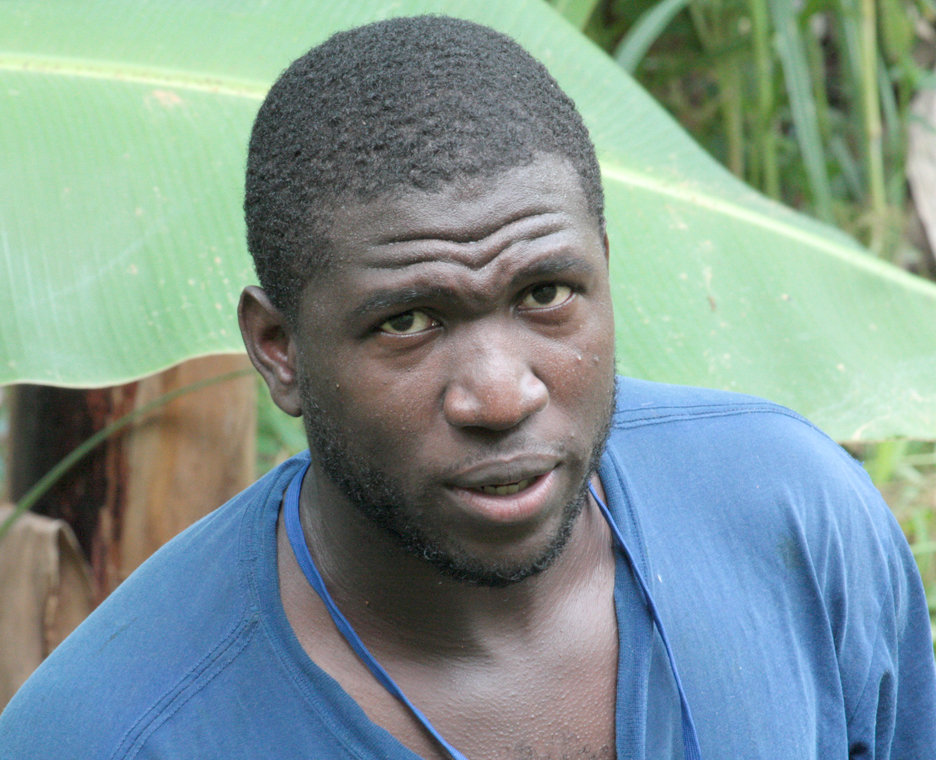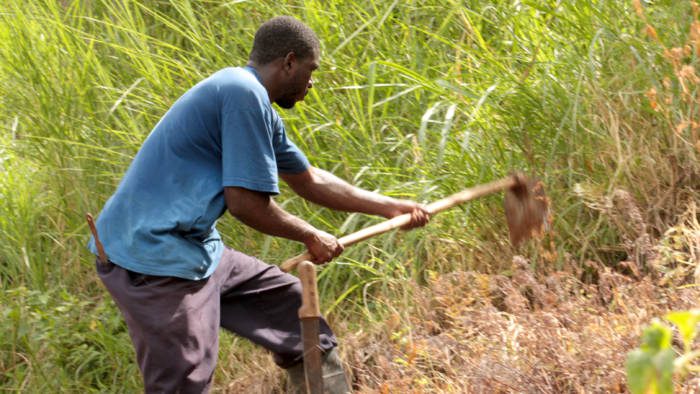
By Kenton X. Chance
Like most 23-year-old Vincentians, Elroy Foster has a smartphone. However, unless he is expecting an important business call, he often leaves it at home when he goes to work, since he is tempted to check it whenever it gives a notification.
This graduate of the Technical Division of the St. Vincent and the Grenadines Community College, who is trained in mechanical technology, is a farmer.
And since the work is labour intensive, he avoids mobile device distractions such as unimportant messages and contacts just trying to chitchat.
Foster says he has been in agriculture all his life but took up full-time farming only four years ago, after graduating from the post-secondary institution.
“I am a fourth generation farmer — my great grandfather, my grandfather, my father and now me,” he explains as he walks on his family’s 15-acre farm in the interior area of Belair.
On “Debique Acres,” as it called, Foster and his father grow root crops and fruits and vegetables. As well, they raise cattle, sheep, goats, pigs and chickens.
“We’ve farmed for many years. So as a young boy growing up, you had your little sheep and goat and so on. Eventually, you grow into it and you realise this is something that you actually love and you continue doing it while making a living for yourself,” Foster says.
After graduating from college, Foster applied for jobs at several companies, while continuing to farm part-time.
However, he said, the job market was “really, really tough” and he decided to go back to the land full time.
“Why fight up with a job when I can be self-employed and even employ some others?” he asked rhetorically, beads of sweat running down his face on a humid mid-October morning.
Three of his employees — two women and one man — work diligently under the cloudy sky, pulling weeds from a bed of chives.
Foster says he employs between three and four persons, intermittently.
Although unemployment is a major problem in St. Vincent and the Grenadines, it is not easy to find persons who are willing to work on the farm, he says.
Foster has decided to go into agriculture at a time when experts in the Caribbean are expressing concerns about the future of the sector, in light of the fact that the average farmer in the region is over 50 years old.
The young entrepreneur has had to cope with derision by some of his peers over his decision to continue his family’s farming tradition.
“…they will say, ‘You went to secondary school; you went to college.’ They look at it as a dirty job,” Foster says.
Many young people see farming as hard work but Foster thinks all work requires effort.
“Nothing is easy,” he says. “I like the hard work because it makes me feel a sense of worth — working for your own money and doing it honestly.”
But not everyone in St. Vincent and the Grenadines shares Foster’s respect for the values of hard work and honesty.
In 2009, seven goats, worth about EC$2,000, were stolen from his farm while he was overseas.
Praedial larceny is a real challenge for the nation’s farmers, although Foster says that theft of produce is not a problem on his farm.
Other challenges include the price of fertilizer, which “keeps going up,” Foster says.
Pests and diseases are not a major problem, he says. The most common issues are grubs eating potato tubers, the armadillo — a non-native mammal that was introduced into the country some decades ago — that burrows into the earth and eats root crops, and diseases such as leaf spot and black sigatoka that affect plantains, he explains.
Farmers in the region are also susceptible to losses from natural disasters such as Hurricane Tomas, which destroyed most of country’s banana cultivation in 2010.
The storm wrecked Foster’s sheep pens and pigsty and damaged some of his fruit trees.
Notwithstanding the challenges, Foster says, he will continue farming.
“It is something that I have grown into. Yes, there will be challenges in it, but I have decided to farm. I will always be a farmer.”
He sees his efforts as an important contribution to the development of the country.
“I am helping with the economic growth of the country in terms of producing food, and some of the food gets exported, so I am a part of helping to develop the country as a whole.”
The Ministry of Agriculture has been holding workshops and trying to enlighten farmers about the importance of their role in food security, he says.
“We need to produce more,” he says, mentioning also a need to practice good farming habits, comply with the rules, and reduce the use of chemicals.
Another dimension of farming that inspires Foster is the land to table concept.
“I try to eat mostly what I grow. And it helps to save money, in terms of buying a lot of stuff by the shop. And then, sometimes, you don’t even know what you are eating because a lot of that stuff is produced using a lot of chemicals. When I grow my stuff, I know what I produce, so I feel more comfortable eating what I produce.”
Like most businesspeople, Foster is tight-lipped about how much money he makes from his enterprise, but is confident that he has a financially secure future as a farmer.
He thinks that in the next five years, he will be well on his way to success.
“I see myself cultivating more lands and achieving certain things, like a house and family and these things. It is quite possible, if I work hard enough,” he says.
He also sees farming as a worthwhile pursuit for other young people in the country and a means of earning some quick cash.
“There is a lot of waste (idle) land in the country. So youths who are unemployed, start to do something; grow some vegetables. You don’t have to do the root crops. Vegetables [take] only six weeks [to mature], so you can make some money instead of being on the block (roadside) not making anything,” he says.
While many youths may see farming as hard, unattractive work, Foster has some encouraging words for them.
“Farming is like this: whatever you put in is what you get out. So, it can be quite rewarding at times.”







This is a very encouraging story . Mr. Foster has demonstrated the biblical concept of how we human beings ought to sustain ourselves and family. In the sweat of thy face shalt thou eat bread (food), till thou return unto the ground; for out of it wast thou taken: for dust thou art, and unto dust shalt thou return. You did not allow your academic qualifications to deter him from working because its not a white collar office Job. I applaud your vigor and willingness to work. Elroy Foster, I commend you for your appreciation of work. Many of your peers who think, that it is beneath them to work on the farm and do menial task, because they like you have community college degree, they do not understand and appreciate your worth and value to our society as a farmer, producing healthy foods for us to eat. Hats off to you Mr Foster, well done and keep up the good work and continue to be an example to other young people in SVG. Thank you Mr.Kenton Chance for capturing this story.
God bless you Elroy. You will NEVER be hungry.
Brother Elroy, I want you to know that I am very proud of you. You have tried the road that the system mapped out for you and it failed you. So you gravitate naturally in a wise way toward what God has set up here in SVG for us. Healthy volcanic soil, beautiful sceneries and waters full of fish. Your example is vital education for all of the idle ones who are waiting and begging. You are doing what the useless politrikans are afraid to do. They are cowards who are afraid to make the necessary changes to the Education System to channel the minds of the youths to create for themselves.
Here is a small example for a Juice bar that sells healthy fresh fruit and vegetable juices. Lets say you sell on the low end $600 a day, That’s $3600 per week or $187,200 per year. If you work to triple your sales each week , you see the potential. If you can do it brother then go for it. We must get away from the hopeless example of our Prime Minister who goes around the world borrowing and begging for money to pay for things while killing things like the banana industry that will produce for us. There is a mathematical formula that says Debt=Death. I am calling out the coward politrikans who continue to maintain the status-quo for their own selfish purpose. As long as they can keep you ignorant with their politriks of self-destruction then they continue to make good for themselves and have the nerve to tell you how hard they are working for you. Brother Elroy keep up the good works and may God bless you and your family with good health, strength and great prosperity.
great job son. An honest work,honest pay.